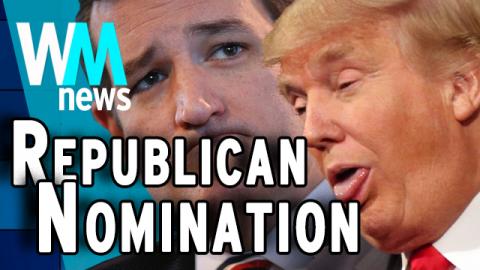Top 5 Need To Know Facts about the Contested Republican Nomination

The race for the 2016 Republican Party's presidential nomination is one of the closest in history, and could inspire the first contested convention of the twenty-first century. Welcome to WatchMojo News, the weekly series from WatchMojo.com where we break down news stories that might be on your radar. In this instalment, we're counting down 5 facts you should know about the contested Republican nomination process.
Top 5 Facts About The Contested Republican Nomination
The race for the 2016 Republican Party’s presidential nomination is one of the closest in history, and could inspire the first contested convention of the twenty-first century. Welcome to WatchMojo News, the weekly series from WatchMojo.com where we break down news stories that might be on your radar. In this instalment, we’re counting down 5 facts you should know about the contested Republican nomination process.
#5: What Is the Republican National Convention?
The Process
The Republican national convention is held whenever there’s an upcoming US presidential election, in order to nominate an official Republican candidate to run for the White House, and to establish the party platform, rules and values for the forthcoming campaign. The Democrats stage a similar event for their party, usually around the same time as the Republicans. In 2016, the RNC will take place at Quicken Loans Arena in Cleveland, Ohio – the home of the Cleveland Cavaliers – from July 18th to 21st. While on some occasions the outcome of the convention is almost a foregone conclusion such is the strength of support for one candidate in particular, 2016’s is set to be one of the most hotly contested, and potentially controversial conventions ever.
#4: Who Are the Major Republican Candidates for Nomination?
The Election
There are three major Republican candidates heading to the 2016 convention, after a series of high profile dropouts including Jeb Bush, Ben Carson and Marco Rubio. Canadian-born Ted Cruz edged the Iowa caucuses and was an early favorite to secure the candidacy; while Ohio governor John Kasich kept his seemingly slim hopes of nomination alive with a primary win in his home state of Ohio. However, the campaign of business mogul, Donald Trump, has generated the most media coverage and debate. Trump’s brash policies, unconventional manner and disdain for political correctness have earned him international headlines, and significant support. His views have divided voters, and, to some extent, the Republican party itself.
#3: What Happens If Donald Trump Does Not Get Enough Delegates?
The Situation
For all Trump’s growing support, however, he must acquire over 50% of delegates at the RNC – that’s 1,237 of 2,472 – to run as the Republican candidate. However, many Republican leaders have made a concerted effort to derail his nomination. This anti-Trump campaign would ultimately offer an independent nominee in the general election, one with more Republican held values and traditions in the hopes of blocking Trump. However, by mid-March 2016, Trump had already assumed a commanding lead, amassing 678 delegates to Cruz’ 423 – but that’s still just a little over halfway to an outright win. If a candidate fails to secure a majority of delegates, an increasing possibility in 2016, the Republicans will head to what’s known as a brokered, or contested, convention. This is the situation in which, after all delegates, including the 112 that are unbound by voting primaries and caucuses, partake in a first ballot and are unable to find a winner, so a second round of balloting ensues. For the 2016 convention specifically, due to the RNC’s ‘Rule 40’, only candidates with signatures of support from the delegate majority of eight or more states are even eligible to get the nomination. The last “contested” convention happened in 1976, when Gerald Ford defeated Ronald Reagan in the first round of voting – though it can be argued that this technically wasn’t a real brokered situation.
#2: What Happens If the Convention Is Brokered?
The Rules
If the first ballot doesn’t result in any one candidate receiving a delegate majority, then a brokered convention ensues. At this point, the whole process becomes even less predictable, as all delegates are no longer necessarily tied to their original candidate, and are free to vote for whomever they want. As every delegate can be persuaded to change his or her vote, it means that a previous leader may run out the eventual loser. The rounds of voting continue until a delegate majority is gained, even if that means multiple ballots. When it comes to the Democrats, the last brokered convention took place in 1952 in which no one won the nomination after the first floor ballot. Meanwhile, the most recent Republican brokered convention was held in 1948, and was settled after three ballots. In 1880, it took the RNC 35 ballots to determine a winner, which was eventual president James A. Garfield.
#1: Who Will Win the Republican Nomination?
The Victor
The fact that a brokered convention is a real possibility is indicative of how close the 2016 Republican nomination race is. Donald Trump and Ted Cruz have emerged as the strongest candidates throughout the primaries, but if neither secures the magic 1,237 majority, then their initial dominance could have little effect. John Kasich may enter back into the running in Cleveland, as could other figures that had previously dropped out, or even declined to run in the first place. A brokered convention could result in a voting free-for-all, and an outcome that’s difficult to predict. If it does come down to multiple votes, however, the Republicans will hope for a rare spot in history; the last American president produced by a brokered convention was Franklin D. Roosevelt in 1932.
